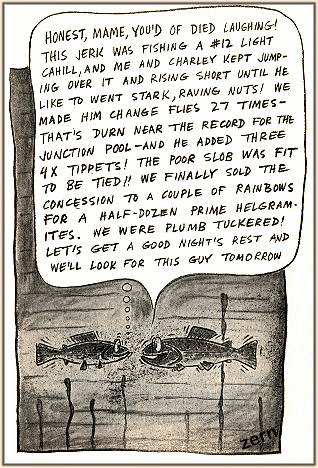It really doesn't matter if the water pressure changes that much,
we make the mistake of thinking that the change has to be
detected at the conscious level (which is very unlikely no matter
how small the brain of the fish is). These changes are detected
by very sensitive nerves. How sensitive is the lateral line on a fish?
How does a fish detect food when it can't "see"? Once you read
about how sensitive a fish is to it's environment, then it should
come as no surprise that a barely measurable effect could change
their behavior. Heck, in humans we "react" to things at the systemic
level that our brains are totally unaware of, even if we're told.
Each "system" in complex organisms act independently but affect
the entire organism. Who knows if the static charges accompanying
fronts is a 2nd order effect that really is at the root of the change
in behavior.
As a side note about seemingly non-obvious cause-effect relationships,
I used to have a paper written by Bell Labs researchers (when ma bell
still existed and when we had a sub-unit called "Sub Marine Systems"
the unit which layed transatlantic cables) studying the subtle electromagnetic
currents carried in cables and how they induced shark bites. Yes, it's now
well known about how sharks are attracted to electromagnetic currents,
but at the time, this was brand new information. They actually had to redesign
the cables to (a) withstand shark bites and (b) minimize the leakage of these
currents into the surrounding water. I may still have this paper somewhere in
the garage as I kept certain esoteric things each time I cleaned out my desk
during job changes.
I think a biologist could probably quantify how sensitive known organs are
in a fish to external stimulus and we'd probably be shocked about how sensitive
these creatures really are. But I also wouldn't be surprised that real research
could uncover things we know nothing about in this regard.
The data is there which suggests that something really happens: there
is a cause and effect, we just don't know the exact cause nor the exact
effect (biologically that is... behavioral effect is "the increased bite"

)

